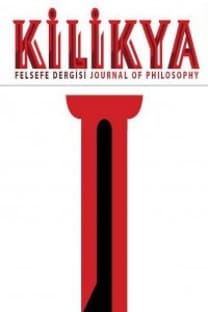“Nedir?” ve “Nereden/Nasıl Anlarız?” Sorularından Performatif Felsefenin Ürettiği “Devinen Bilgi”ye Doğru
Devinen bilgi kavramının araştırılması performatif felsefe araştırma alanı içerisinde verimli olabilecek bir alan açmaktadır. Bu bağlamda, felsefe yapma biçimi için önemli bulduğum üç soru tipini hem ayrı ayrı hem de ilişkileri içerisinde araştırmaya çalışacağım. İlk olarak felsefenin geleneksel olarak kabul edilen “nedir?” soru tipine ilişkin yorumlamamdan yola çıkacak, sonrasında ise nasıl’ın bilgisinden farklı olarak sorduğum “nereden/nasıl anlarız?” soru tipinin Bergsoncu sezgiden zekâya giden yöntemle nasıl pratiğe dönüştürülebileceği üzerinde duracağım. Nedir’li soruların deneyimin içinden ve süreç içerisinde sorulmalarının önemini vurgulayacak ve bizi deneyimin kendisi içerisine yerleştiren “nereden/nasıl anlarız?” soru tipinin “olma haline nasıl geçeriz?” soru tipine nasıl zemin hazırladığını araştıracağım. Nedenleri ve sonuçları tam olarak belirleyip bilemeyeceğimiz, “olma halleri”ne geçebilmek için yaratılan performatif ortamlar aracılığıyla olanakların deneylenmesi sonucu üretilen devinen bir bilgi türünden söz edeceğim. Felsefeye performatiflik içerisinden yaklaştığımızda ve yaratılan olma halleri’ni felsefe yapma biçiminin temeline koyduğumuzda, felsefenin birarada-üretilen bilgi için ortamlar yaratan bir pratiğe dönüştüğünü göstermeye çalışacağım.
From the Questions “What is?” and “How do We Understand?” Towards Knowledge-in-Motion that Performative Philosophy Produces
A study of the concept of “knowledge-in-motion” presents itself as a promising area of research within performative philosophy. Since any attempt towards attaining knowledge starts from a question, I will try to explain the concept of “knowledge-in-motion” departing from a specific type of question that initiates the generation of this type of knowledge. To provide a background for discussion, I will first be dealing with two other types of philosophical questions, which would be retaining their importance in their interrelation with the aforementioned third type of question. I will first remark on the traditional questions of philosophy of the type “what is?” Then I will consider how Bergson’s method from intuition to intelligence helps us to depart from questions of the type “how do we understand?” to develop a practice-based philosophy. It is important to note that questions of the type “what is?” are now expected to be asked within the context of experience. Moreover a question of the type “how do we understand?” places us within the experience and―as such―it may give way to a question of the type “how can we pass into a state of being?” Knowledge-in-motion as related with questions of this type neither assumes, nor guarantees that we can know the causes and effects. Such knowledge is produced as a result of experimenting possibilities by means of performative milieus for producing-knowledge-together that are created with the aim of passing into “states of being”. Thus we arrive at a concept of knowledge that supports a view of philosophy considered as a practice. For, according to this conception of knowledge, our knowledge-producing activities are realized and evaluated within contexts of performativity.
___
- Austin, J. L. (2009). Söylemek ve Yapmak. (L. Aysever, Çev.). İstanbul: Metis.
- Bergson, H. (1932). Essai Sur Les Données Immédiates De La Conscience. Paris: Librairie Félix Alcan.
- Bergson, H. (1939). La Pensée et Le Mouvant. Essais et Conférences. Paris: Librarie Félix Alcan.
- Brentano, F. (1889). The Origin of Our Knowledge of Right and Wrong. New York: Routledge.
- Croce, B. (1983). İfade Bilimi ve Genel Linguistik Olarak Estetik. (İ. Tunalı, Çev.). İstanbul: Remzi Kitabevi.
- Deleuze, G. (2017). Fark ve Tekrar. (B. Yalım, E. Koyuncu, Çev.). İstanbul: Norgunk Yayıncılık.
- Gauß, E. M. & Totzke, R. (2015). On Performative Philosophy -10 Impulses Discussion From [Soundcheck Philosophie]. Performance Philosophy, vol. 1, 74-94.
- Kurtoğlu Taşdelen, D. (2003). Bergson’un Metafizik Özgürlük Anlayışı. Felsefe Tartışmaları, 31, 69-86.
- Kurtoğlu Taşdelen, D. (2017). Sanat-Bilgi İlişkisi Bağlamında Sanata Özgü Farklılığın Felsefece Araştırılması, Özne, 26.
- Kurtoğlu Taşdelen, D. (2018). Felsefi Düşünmenin Bir Başka Biçimi: Performatif Felsefe Nedir? Felsefe Yazın, 24, 24-33.
- Kurtoğlu Taşdelen, D. (2020). Kendini Varedebilme Etiği. İstanbul: Pinhan.
- Uygur, N. (1984). Felsefenin Çağrısı. İstanbul: Remzi Kitabevi.
- Whitmire, J. F. (2006). The Double Writing of Les Mots: Sartre's Words as Performative Philosophy. Sartre Studies International içinde, (12) 2, 61-82.
